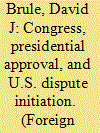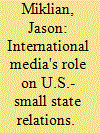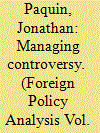|
|
|
Sort Order |
|
|
|
Items / Page
|
|
|
|
|
|
|
| Srl | Item |
| 1 |
ID:
084294


|
|
|
|
|
| Publication |
2008.
|
| Summary/Abstract |
Recent research on strategic conflict avoidance and targeting in the American case shows that states avoid militarily challenging presidents whose domestic situations might be improved by diversionary conflict, and that congressional opposition to presidential foreign policy invites increased challenges by decreasing other states' perceptions of likely American resolve. This article seeks to refine these lines of research by considering the intervening effects of partisan ideology. As previous scholarship indicates that diversion is a more attractive option for conservative than for liberal governments, there are likely greater incentives for other states to strategically avoid Republicans given lagging economic conditions. Conversely, the relative liberal aversion to military ventures means that the resolve-undermining effects of congressional opposition are likely more pronounced for Democrats. Analyses of the American foreign policy experience from 1949 to 2001 provide support for these hypotheses, as increases in the misery index are related to substantial decreases in the militarized targeting of Republican administrations and congressional foreign policy opposition acts are related to substantial increases in the militarized targeting of Democratic administrations.
|
|
|
|
|
|
|
|
|
|
|
|
|
|
|
|
| 2 |
ID:
084291


|
|
|
|
|
| Publication |
2008.
|
| Summary/Abstract |
Do presidents initiate disputes in response to low public approval ratings? Although research on the diversionary use of force finds links between poor economic conditions and military disputes, findings evaluating the effect of presidential approval ratings typically fail to support the diversionary hypothesis. But this research tends to neglect the role of presidential-congressional relations in the president's foreign policy making processes. This paper applies the policy availability argument to the puzzle: legislative constraints on presidential action during periods of low public approval compel the president to pursue alternatives that he can implement largely on his own in order to display his leadership skills-including the use of military force abroad. The argument is tested by examining the interactive effects of congressional support for the president and presidential approval ratings on the propensity to initiate militarized interstate disputes from 1949 to 2000. The results indicate that the president is more likely to use force in response to low presidential approval when faced with low congressional support.
|
|
|
|
|
|
|
|
|
|
|
|
|
|
|
|
| 3 |
ID:
084293


|
|
|
|
|
| Publication |
2008.
|
| Summary/Abstract |
U.S. foreign policy relationships toward states with which it assumes limited geostrategic significance are often simplistic in design and misguided in their calculations because of the disproportionate weight given to the limited information from which policy is synthesized. International media outlets exacerbate this problem by underreporting, improperly framing stories, combining distinct events, piggybacking upon their domestic counterparts, encouraging simplifications, and misrepresenting reality on the ground. Recent U.S.-Nepal policy is a prototypical example, as a complex civil war with multiple actors was reduced in the eyes of U.S. policy makers to a simplistic terrorist uprising and treated as such until additional media attention propagated a substantial re-examination of policy. Although this case is more explanatory than predictive, this basic framework may enlighten a more nuanced overall understanding of U.S.-small state relations.
|
|
|
|
|
|
|
|
|
|
|
|
|
|
|
|
| 4 |
ID:
084295


|
|
|
|
|
| Publication |
2008.
|
| Summary/Abstract |
This article attempts to explain why the U.S. recognition of Macedonia's independence was such a long and controversial issue that lasted from 1991 to 2004. Based on a defensive positionalist model, this essay suggests that the search of regional stability in the South Balkans was the consistent interest pursued by the U.S. toward Macedonia, and that this preference justifies the slowness with which the U.S. granted recognition. The article also runs counter to the ethnic lobby argument, which is increasingly regarded as a major determinant of American foreign policy toward self-determination movements. More specifically, the analysis casts serious doubt on the proposition that the Greek-American community, through its mobilization, compelled the U.S. government to delay Macedonia's recognition, despite what some liberals have argued.
|
|
|
|
|
|
|
|
|
|
|
|
|
|
|
|
| 5 |
ID:
084292


|
|
|
|
|
| Publication |
2008.
|
| Summary/Abstract |
When can economic sanctions and incentives achieve important political objectives? Why do they often fail? We propose a political theory of economic statecraft, arguing that the success of economic statecraft does not depend on the magnitude of its economic effect. Instead, it succeeds when the economic pain or gain it engenders translates into political costs or opportunities. We argue that the political effects of economic signals will depend on a variety of international and domestic political factors, the most important of which is the target state's level of stateness, comprised of three components: autonomy, capacity, and legitimacy. When economic statecraft motivates key domestic coalitions to push for policy change, high stateness enables target state leaders to resist their calls and defy the sender. Conversely, when economic statecraft convinces target leaders that they ought to comply with the sender's demands, high stateness enable them to overcome domestic opposition to compromise. To evaluate the usefulness of our theory, we employ a plausibility probe, testing our approach against three leading alternatives (the realist, economic liberal, and domestic conditionalist approaches) with case studies of Western economic incentives to Hungary and Romania after the Cold War and Indian sanctions against Nepal in the late 1980s.
|
|
|
|
|
|
|
|
|
|
|
|
|
|
|
|
|
|
|
|
|